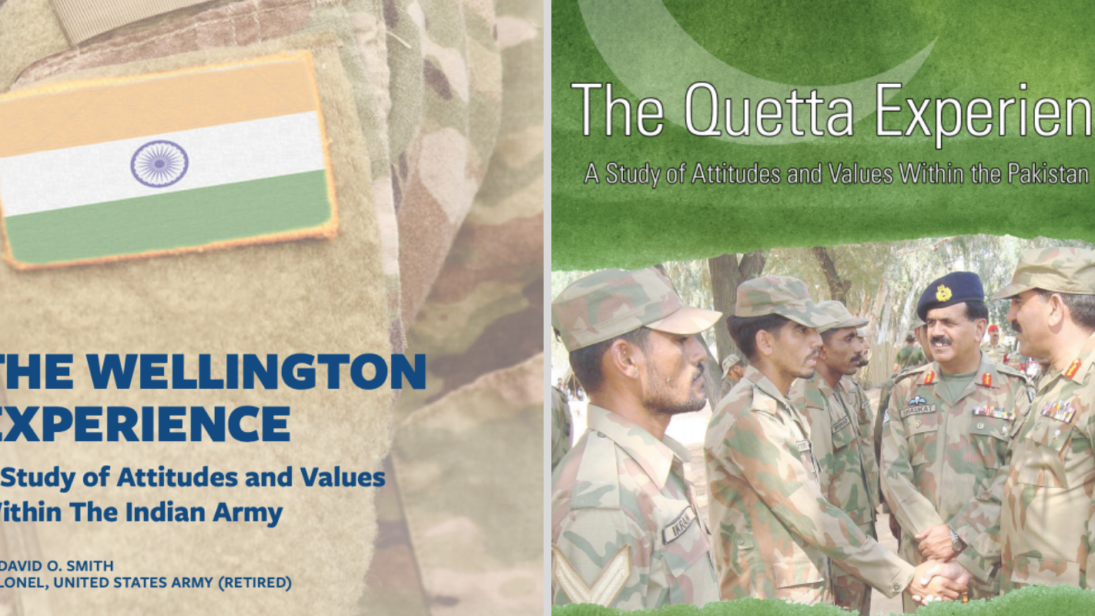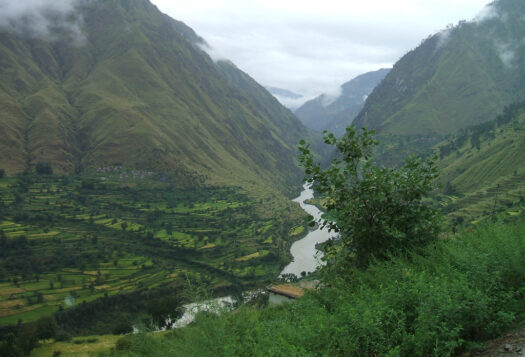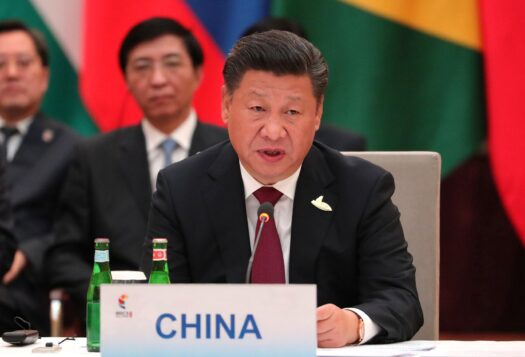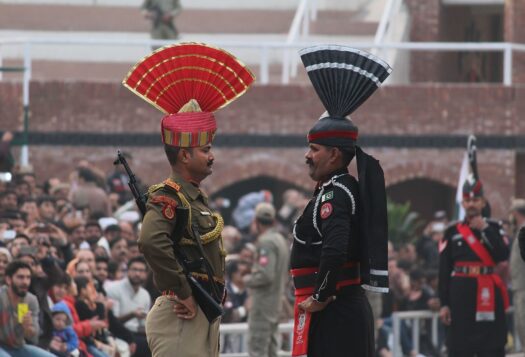
In the webinar following the South Asian Voices series Reviewing the Quetta and Wellington Experience, regional experts from India and Pakistan review and discuss two books by Stimson Center Distinguished Fellow, Col. David Smith (retd.): The Wellington Experience: A Study of Attitudes and Values within the Indian Army and The Quetta Experience: A Study of Attitudes and Values within Pakistan’s Army.
In this panel discussion, Col. David Smith (retd.), Brig. Naeem Salik (retd.), Reshmi Kazi, Sadia Tasleem, and Aditi Malhotra discuss each book’s observations on topics including the Indian and Pakistani armies’ internal and external threat perceptions, civil-military relations, and nuclear issues.
Watch their full discussion on the themes of each book and what they may portend for future India and Pakistan’s security dynamics and regional priorities below.
Featured Speakers:
David Smith: David O. Smith is a Distinguished Fellow with the South Asia program at the Stimson Center. Smith is an independent consultant to Lawrence Livermore National Laboratory and Science Applications International Corporation on issues related to South Asia and regularly participates in three series of quasi-official (Track 2) engagements with senior Pakistan and India officials sponsored by Livermore, the Naval Postgraduate School in Monterey, California and the Woodrow Wilson International Center in Washington D.C. He retired from government service in May 2012 after serving in a senior executive position in the Defense Intelligence Agency. Prior to that, he was Senior Country Director for Pakistan in the Office of the Under Secretary of Defense (Policy) in the Department of Defense. During thirty-one years of active duty service in the U.S. Army, he spent twenty-two years dealing with politico-military issues in the Near East and South Asia, retiring as a colonel, including six years as the U.S. Army Attaché in Islamabad, Pakistan.
Naeem Salik: Naeem Salik has a PhD in Political Science & International Relations from University of Western Australia, an M.Sc. in Strategic Studies from Aberystwyth University, UK and a B.Sc (Hons) War Studies from Balochistan University. He is currently working as a Senior Fellow at the Center for International Strategic Studies, Islamabad. He is a former Director Arms Control & Disarmament Affairs at the Strategic Plans Division. Salik has taught at the Quaid-i-Azam University and National Defense University at Islamabad. He has been a visiting fellow at the Stimson Center, Stanford University, Brookings Institution and SAIS, Johns Hopkins University. His publications include Genesis of South Asian Nuclear Deterrence, Oxford University Press, 2009, Learning to Live the Bomb, Oxford University Press, 2017, Nuclear Pakistan – Seeking Security and Stability (edited), University of Lahore Press, 2018 and India’s Habituation With the Bomb (Edited), Oxford University Press, 2019. He has also written several Monographs, book chapters and 36 research articles.
Read Naeem Salik’s response to The Wellington Experience here.
Reshmi Kazi: Dr. Reshmi Kazi is Associate Professor in the Jamia Milia Islamia (Central University). She specializes in nuclear security, nuclear non-proliferation, and nuclear disarmament. Her doctoral thesis is on “Evolution of India’s Nuclear Doctrine: A Study of Political, Economic and Technological Dimensions” from Jawaharlal Nehru University, New Delhi. She has written extensively on nuclear security issues and made several presentations including a paper on “Nuclear Terrorism and UN Resolution 1540: A South Asian Perspective” at the UN Headquarters, New York. Her publications include monographs on “Post Nuclear Security Summit Process: Continuing Challenges and Emerging Prospects” (2017) and “Nuclear Terrorism: The New Terror of the 21st Century” (2013). She is an alumni of National Defense University’s Near East South Asia Center for Strategic Study, Washington DC and a Visiting Fellow (Summer 2016) for the South Asia programme in the Stimson Center, Washington DC. Her aim is to research and publish on critical areas pertaining to nuclear issues that can contribute to future policy making.
Read Reshmi Kazi’s response to The Wellington Experience here.
Sadia Tasleem: Sadia Tasleem is a lecturer at Quaid-i-Azam University’s Department of Defense and Strategic Studies in Islamabad, Pakistan. As a Robin Copeland Memorial Fellow for Nonproliferation from 2014 to 2015, she undertook a research project entitled “Creating a Constituency for Unilateral Nuclear Arms Control in Pakistan.” Also, as a core member of the Program on Strategic Stability Evaluation (POSSE) she has done extensive research on various aspects of Strategic Stability, Nuclear Learning and the implications of Knowledge Diffusion with a focus on Pakistan. Previously, she worked as a senior research scholar at the Institute for Strategic Studies, Research and Analysis at the National Defense University; a research associate at the International Islamic University; and a lecturer at the Department of International Relations, National University of Modern Languages in Islamabad.
Read Sadia Tasleem’s review of The Quetta Experience here.
Aditi Malhotra: Aditi Malhotra is a Co-Editor for the Journal for Intelligence, Propaganda and Security Studies. She holds a Ph.D. in Political Science from the University of Muenster, Germany and an MA in International Studies from the University of Sheffield, United Kingdom. Her research interests include Indo-Pacific security and geopolitics, nuclear proliferation, and strategy.
Read Aditi Malhotra’s review of The Quetta Experience here.
Akriti Vasudeva (moderator): Akriti Vasudeva is a Research Analyst with the South Asia Program at the Stimson Center. Her research focuses on U.S.-India defense and strategic cooperation, geopolitics of South Asia and the Indo-Pacific, and Indian foreign policy. Previously, she worked as a print journalist in India, reporting on environmental issues for The Indian Express in Mumbai, and on education policy for Hindustan Times, New Delhi. She has also held research positions at the Embassy of India in Washington, D.C. and the Institute for Defence Studies and Analyses in New Delhi, among others. She holds an M.A. in Asian Studies from the Elliott School of International Affairs, George Washington University and a bachelor’s degree in information technology engineering from the University of Mumbai.


